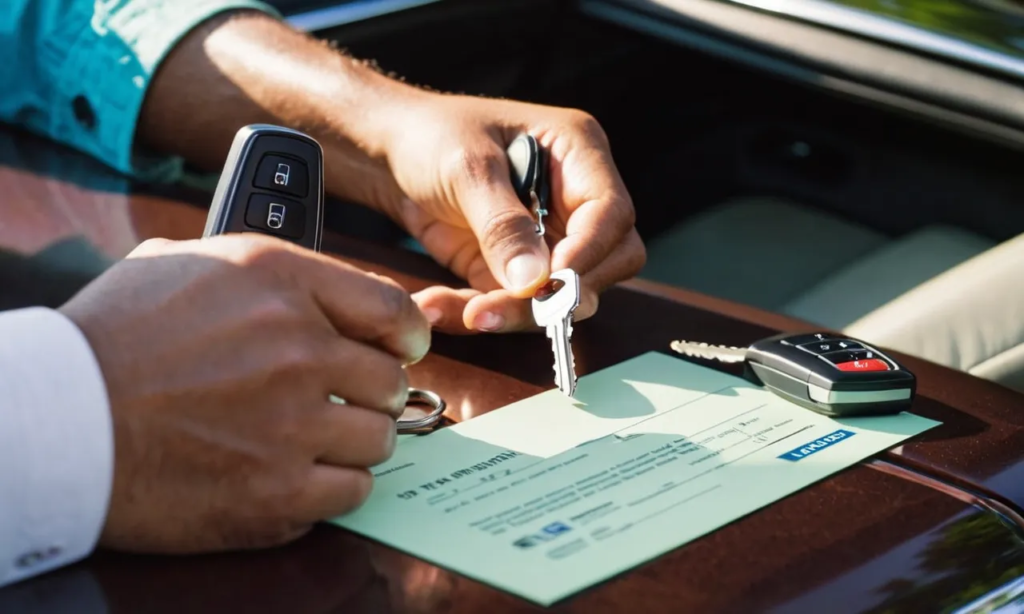Vehicle title jumping in Illinois refers to the illegal practice of transferring ownership of a vehicle without properly registering it in the new owner’s name. This fraudulent act allows individuals to bypass certain legal requirements, such as paying taxes or fees, and can lead to severe legal and financial consequences for buyers, sellers, and third parties, including lenders and insurance companies.
Understanding Vehicle Title Jumping
At its core, “title jumping” involves a seller transferring a vehicle’s title to a buyer, who subsequently sells the vehicle to another party without ever registering the vehicle in their name. This creates a gap in the ownership record and makes it difficult for authorities or future owners to verify the vehicle’s history. Title jumping is illegal in Illinois, as state law requires every vehicle owner to apply for a certificate of title.
Under the Illinois Vehicle Code, 625 ILCS 5/3-101, every owner of a vehicle in the state must apply to the Secretary of State for an Illinois certificate of title for the vehicle. The law clearly prohibits any person from transferring a vehicle without properly documenting the transfer through this legal channel. Failure to comply with this statute can result in fines, penalties, and even criminal charges, depending on the severity of the violation.
Common Scenarios of Title Jumping
Title jumping is often seen in the used car industry, particularly in situations where vehicles change hands quickly or are sold at auctions. A common practice involves a dealer working with a middleman to purchase vehicles at auction. The middleman might take possession of the vehicle but fails to properly register it, instead selling the car to another party.
In other lawsuits, individuals may engage in title jumping to avoid sales tax or registration fees. By skipping the registration process, title jumpers avoid paying the necessary taxes that are typically assessed when a vehicle changes hands. This practice not only defrauds the state of revenue but also makes it challenging for future buyers to trace the vehicle’s history, including accidents, liens, or other legal encumbrances.
Legal Consequences of Title Jumping in Illinois
Title jumping is not merely a technical violation; it is considered a form of fraud under Illinois law. The state takes a stringent stance against title jumping because it undermines the integrity of vehicle transactions and can lead to numerous legal complications.
Some of the legal consequences include:
- Fines: Individuals or businesses caught engaging in title jumping may face substantial fines.
- Criminal Penalties: In more severe lawsuits, title jumping can result in misdemeanor or felony charges, especially if the fraudulent transaction involved high-value vehicles or if the individual has engaged in multiple instances of fraud.
- Revocation of Dealer Licenses: For car dealerships involved in title jumping, the Illinois Secretary of State can revoke or suspend their license to operate. This is a serious consequence for dealers who rely on their reputation and ability to legally sell vehicles.
Lawsuit Study: Nudi Auto RV & Boat Sales v. John Deere Insurance Co.
The lawsuit of Nudi Auto Rv & Boat Sales v. John Deere Insurance Co., 328 Ill. App. 3d 523 (1st Dist. 2002) highlights the complexities that can arise when a vehicle’s title is not properly handled. In this lawsuit, a car dealer used a middleman to purchase vehicles at auction. The middleman was responsible for handling the funds and delivering the title after payment to the auction house. However, the middleman became insolvent and failed to pay the auction house, leaving the dealer without legal title to the vehicles.
The dealer was then forced to pay additional money to the auction house to avoid repossession of the vehicles. When the dealer sought coverage under its insurance policy, the insurer argued that it was not liable for the losses, citing several statutory exceptions for bona fide purchasers.
However, the Illinois Appellate Court disagreed, ruling in favor of the dealer. The court held that under the plain language of the insurance policy, the dealer was entitled to coverage for the losses. The ruling emphasized the importance of properly handling vehicle titles, as the dealer’s losses stemmed directly from the middleman’s failure to deliver the legal title.
This lawsuit underscores the risks associated with title jumping, particularly for businesses that rely on third-party agents to facilitate vehicle transactions. Even when parties act in good faith, the failure to properly transfer a title can lead to significant financial losses and complex legal disputes.
Preventing Title Jumping in Illinois
In order to address the issue of title jumping, Illinois has implemented several safeguards designed to ensure that vehicle titles are properly transferred and recorded. These measures include:
- Title Verification: Buyers and sellers are encouraged to verify the title status of any vehicle before completing a transaction. This can be done through the Illinois Secretary of State’s office, which provides information about the vehicle’s title history, including whether there are any liens or legal disputes associated with it.
- VIN Inspections: Vehicle identification number (VIN) inspections are required for certain vehicles to ensure that the vehicle’s title matches the physical characteristics of the car. This step helps prevent VIN swapping, another form of title fraud that can be associated with title jumping.
- Mandatory Registration: Every vehicle owner in Illinois is required to apply for a certificate of title in their own name. This prevents individuals from skipping the registration process and selling a vehicle without establishing legal ownership.
- Sales Tax Enforcement: Illinois imposes strict penalties on individuals who fail to pay the required sales tax when transferring a vehicle. Title jumpers often attempt to evade this tax by never officially registering the vehicle, but the state’s enforcement efforts aim to close this loophole.
- Dealer Regulations: Car dealerships in Illinois must follow strict regulations regarding title transfers. Dealers are required to submit title applications on behalf of buyers, ensuring that titles are properly transferred in a timely manner. Failure to do so can result in fines or the suspension of the dealer’s license.
How Buyers Can Protect Themselves
For consumers, purchasing a vehicle with a jumped title can lead to numerous problems, including difficulties registering the vehicle, unexpected liens, or even repossession. To avoid these issues, buyers should take the following steps before purchasing a used vehicle:
- Request a Vehicle History Report: A vehicle history report can provide valuable information about the car’s past ownership, including whether the vehicle has been sold multiple times without being registered.
- Verify the Title: Buyers should always verify the title status through the Illinois Secretary of State’s office. This ensures that the seller has legal ownership of the vehicle and that there are no outstanding liens or disputes associated with the title.
- Check for Red Flags: Be wary of sellers who offer to sell a vehicle without a title or insist on completing the transaction without registering the car in your name. These are common tactics used by title jumpers to avoid detection.
- Use Reputable Dealers: Purchasing from a licensed dealer provides an additional layer of protection, as dealers are required by law to properly transfer titles and handle the necessary paperwork.
Conclusion
Vehicle title jumping in Illinois is a serious practice that can have wide-ranging consequences for buyers, sellers, and third parties. The illegal practice undermines the integrity of vehicle transactions and creates legal complications that can result in financial losses or even criminal charges. By understanding the risks and taking steps to ensure that vehicle titles are properly transferred, individuals can protect themselves from becoming victims of title jumping. The lawsuit of Nudi Auto RV & Boat Sales v. John Deere Insurance Co. serves as a reminder of the importance of handling vehicle titles properly to avoid costly legal disputes.


Author
Mike Simkus
Attorney/Founder, FS CORPS